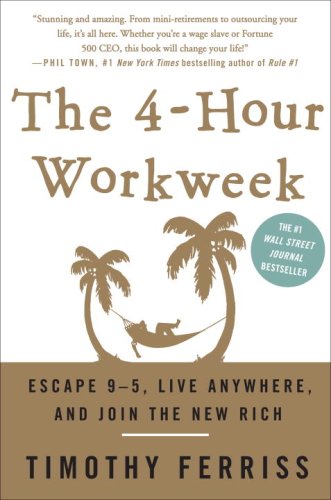We all want to build a business that runs itself. What would it be like to only work 4 hours per week and use the rest of the time to have fun? Well, that would be a dream.
The 4 hour workweek (4HWW) was an absolute bestseller. Tim suggested ‘The Four Hour Workweek’ to help people who are tired of waiting to retire and want life. In the 4HWW, Tim promises you will have all work benefits in no time. Tim has used these techniques and has become, amongst others, the newly rich.
With this book, we will learn about lateral thinking and how to delegate work as a million-dollar business owner so that the 4-hour work week dream comes true. And it is just the beginning.
Tim left school in college and took an emotionally draining sales career. He went to create a soul-sucking company for himself. At one point, Tim worked 80 hours a week for himself instead. He was well paid, but his business was draining. When Tim first learned the Pareto Principle (sometimes called the 80-20 Principle), Ferriss was surprised: reducing distractions and automating systems to make the business profitable and taking less time. Most of them.
Table of Contents
Action: Practice Giving a Command
The 4-Hour Work Week – Key Concepts
- You don’t need all that you think you need — only important tasks
- Most of the things are not important — do not waste time
- Busy is not thinking — fear giving mediocrity
How to give a command?
The idea is to outline a quantifiable business benefit.
Suppose you are anyone like me. You are given the task the majority of the time. Therefore, when it is time to command, you might find yourself doing the job instead. Saying that others cannot do it as properly as you do.
Giving a command is a skill we need to practice to delegate necessary but useless processes. Like booking or scheduling, and so on. Although, you just need the result of the process, which is the room to stay or a 5-minute conversation with someone.
Below are some Do and Don’ts.
The golden rules for outsourcing
- The task must be time-consuming.
- The task must be well-defined.
Common mistakes when delegating are
- Hire low communication skill VA (poor English, so on.)
- Give imprecise directions and do not check VA’s command understanding.
- Don’t give a tight deadline – within 72 hours.
- Don’t request a report in the first few hours to double-check progress.
- Ask for multiple tasks at once.
This book introduces the new rich who lives the dream now, by D-E-A-L with life.
D: Definition
– what is it that you need exactly to live your dream, how much daily expense, where to stay, etc.
The main focus is on dissolution from thinking we would work ourselves to death on a gold watch. Instead, we suggest you abandon some ideas, such as retiring as an absolute gimmick. This assumption shares many characteristics with books like “You’re a millionaire” and ” Freedom movement.
You will find out that what you need is not that much. And to do more of what needs not to be done is a waste.
Rules that change the rules
If we find out that we are constantly solving problems that create unfavorable results, we must ask ourselves: Would it work? For example, Tim found that most cold callers don’t reach the intended audience in his sales position. So he only refers to companies at 09:00-10:00 a.m. and after 4:00 pm. Consequently, this approach avoids common busy times.
E: Elimination
– not all things are important; use the Pareto law to find the fat and trim it.
Evaluate the activities that are helping or hindering your defined goal.
Effective vs. Efficient
- Effectiveness is doing the things that get you closer to your goals.
- Efficiency is performing a given task – important or not – in the most economical manner possible.
Tim claims time management must be forgotten. This is the trap. You should not rush to finish every minute. After deciding what your time is for, you should start thinking of ways to make more money and enjoy your free time. You must remember your actions are more important than what you did when you did them. While efficiency is crucial, it is redundant when not used properly. Tim uses Pareto 80/20 principles in this work. The plan focuses on 20 percent of inputs.
William of OCCAM (1300-1350)
Being efficient without regard to effectiveness is the default mode of the universe. Against the common saying,
"What you do is infinitely more important than how you do it."
Low Information Diet
Tim advises people to be selective to get ahead in their new wealth journey. We should ignore information that’d otherwise be useless or unactionable. Most documents are expensive to obtain. You must evaluate your daily reading and watching activities. Ferriss offers three ways to get rid of unnecessary data.
A: Automation
– delegate the rest of the work to the Virtual Assistant, whether they are personal tasks or professional lives.
Hand over responsibilities and operations of your business will free up your time and enable you to reduce your working hours to the ideal four hours per week.
Developing new skills includes good communication skills and establishing a management network at e-mail addresses and in a virtual environment. To learn the concept, Tim suggested using a digital assistant who teaches other VAs how they are given instructions.
An important aspect of joining the rich is learning how to change yourself. But Ferriss wants a clearer picture of the darker side of a delegation. If there are no clear objectives or vital tasks, then there is no reason to do them.
It explains how to become a low-value-added businessman – also a middleman. It’s intended for middlemen who can create passive income with minimal effort and earn good returns. While this may seem fascinating to others, it isn’t as easy. This depends heavily upon salesmen’s skill and luck (stumbling into an opportunity to find a good product). You may be very good with his examples, but such things aren’t guaranteed.
L: Liberation
– avoid tying up yourself at any time in one place; aim to work remotely.
Be free and wander the world to be inspired to do more creative tasks. Create luxury lifestyles on your terms. Lifestyle design starts with filling demand and freeing up the rest. A To-do list plan is to create a valuable step-by-step asset in your repertoire. Remember, a relative income matters, not an absolute income. Choose to value personal life more than money.
Being busy is a form of laziness – lazy thinking and indiscriminate action.
Tim Ferriss
Filling the void—adding life after subtracting work
After retiring from a full-time job, the gaping hole engulfs a place where you normally find yourself busy working or focusing your attention. These often happen to retired people. It was the same situation that happened to Tim during his initial mini-retirement. It’s important not to panic unless that’s normal. The tougher transition will become if you’ve focused more on your goals. Alternatively, you can experience isolation socially. When there is no external focus, our brains turn inwards. If you find an objective or a purpose, this issue may not be resolved.
Beyond repair – just kill your job.
Occasionally, a job isn’t worth salvaging. Just because you’ve invested so much in something is not worth salvaging. So what are some scary things to consider if you plan a career change?
Mini retirements – embracing the mobile lifestyle
After turning the 3-month holiday into a 15-month trip, Tim was asked: Why should I not retire in 20 to 30 years? Tim recommends taking six months of trips to re-enter the country instead. This way, you will never abandon life entirely, but have a second look at it.
To Sum Up — Live Life
Tim shows how he D-E-A-L with his life to achieve a 4-Hour Work Week.
I felt, though, that his impressive CEO-level management skill is underplayed. But yes, it can be expected that we will increase our productivity with this 4HWW recipe.
Today, we have learned how a great entrepreneur delegates his life.
Get this book on Amazon here!


 Join us, new riches.
Join us, new riches.